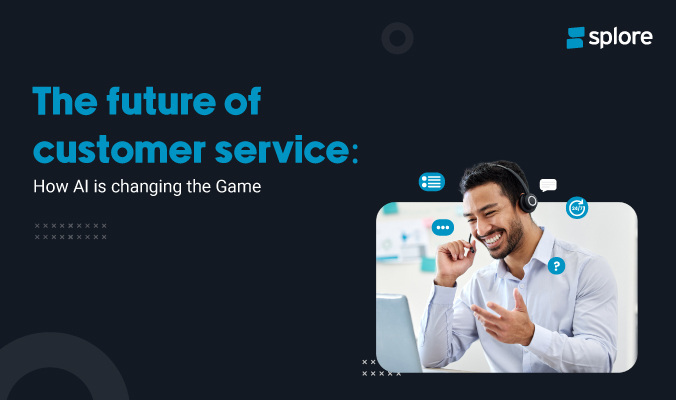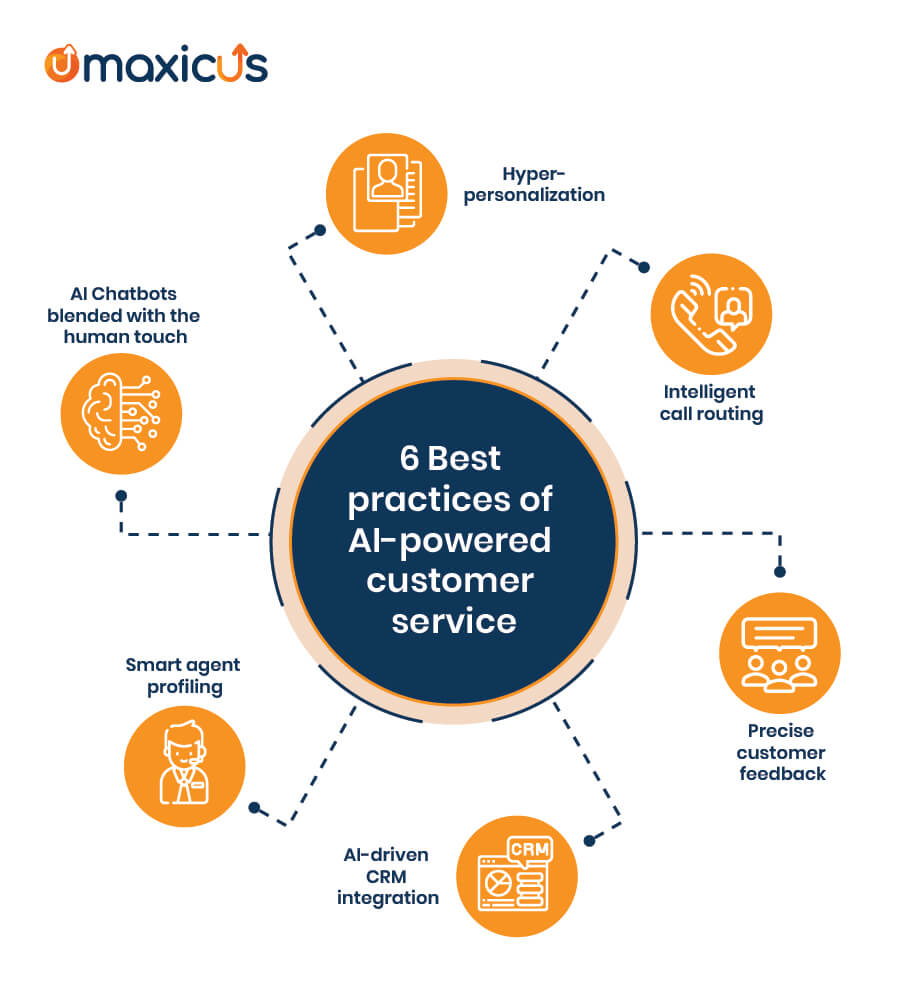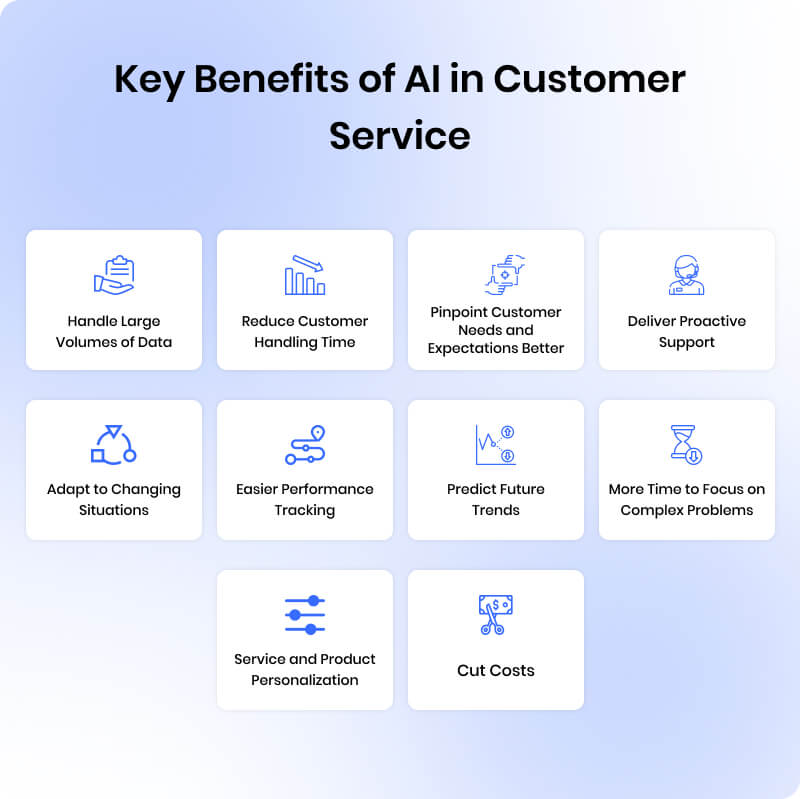The Future of Customer Service: How AI is Changing the Game
Artificial intelligence (AI) is revolutionizing the way businesses interact with customers, transforming the customer service landscape forever. AI-powered chatbots and virtual assistants are becoming increasingly popular, enabling companies to provide 24/7 support, improve response times, and enhance the overall customer experience. By leveraging AI for customer service, businesses can automate routine tasks, freeing up human agents to focus on complex issues that require empathy and problem-solving skills.
One of the primary benefits of AI in customer service is its ability to analyze vast amounts of data, providing valuable insights into customer behavior and preferences. This information can be used to personalize interactions, offer tailored recommendations, and improve the overall customer journey. Moreover, AI-powered chatbots can help reduce the workload of human agents, allowing them to focus on high-value tasks that require creativity, empathy, and complex problem-solving skills.
As AI technology continues to evolve, we can expect to see even more innovative applications in customer service. For instance, AI-powered virtual assistants can be integrated with popular messaging platforms, enabling customers to interact with businesses in a more conversational and intuitive way. Additionally, AI-driven analytics can help businesses identify areas for improvement, optimize their customer service strategies, and measure the effectiveness of their AI-powered solutions.
However, the adoption of AI in customer service also raises important questions about the role of human agents in this new landscape. While AI can automate routine tasks, human agents are still essential for handling complex issues that require empathy, creativity, and problem-solving skills. By combining the strengths of both AI and human agents, businesses can create a more efficient, effective, and personalized customer service experience that meets the evolving needs of their customers.
As we look to the future, it’s clear that AI will play an increasingly important role in shaping the customer service landscape. By embracing this technology and leveraging its potential, businesses can stay ahead of the curve, improve customer satisfaction, and drive long-term growth and success.
Unlocking the Power of AI-Driven Customer Service Platforms
AI-driven customer service platforms are revolutionizing the way businesses interact with customers, offering a range of benefits that can transform the customer experience. By leveraging artificial intelligence for customer service, companies can improve response times, enhance personalization, and increase efficiency. For instance, Salesforce Einstein, a leading AI-powered customer service platform, enables businesses to automate routine tasks, provide personalized recommendations, and predict customer behavior.
Another example of a powerful AI-driven customer service platform is IBM Watson, which uses machine learning to analyze customer data, identify patterns, and provide insights that can inform customer service strategies. By using these platforms, businesses can gain a deeper understanding of their customers’ needs, preferences, and behaviors, enabling them to deliver more personalized and effective support.
The benefits of AI-driven customer service platforms are numerous. For example, they can help businesses reduce the volume of incoming customer inquiries, freeing up human agents to focus on complex issues that require empathy and problem-solving skills. Additionally, AI-powered chatbots can provide 24/7 support, enabling customers to get help whenever they need it. This can lead to increased customer satisfaction, loyalty, and retention.
Moreover, AI-driven customer service platforms can help businesses improve their efficiency and productivity. By automating routine tasks, such as answering frequently asked questions or providing basic support, businesses can reduce the workload of human agents, enabling them to focus on higher-value tasks. This can lead to cost savings, improved morale, and increased job satisfaction.
Overall, AI-driven customer service platforms offer a range of benefits that can transform the customer experience. By leveraging artificial intelligence for customer service, businesses can improve response times, enhance personalization, and increase efficiency, leading to increased customer satisfaction, loyalty, and retention.
How to Implement AI in Your Customer Service Strategy
Implementing artificial intelligence for customer service requires a strategic approach to maximize its potential. To get started, businesses should identify areas where AI can add value, such as automating routine tasks, providing personalized support, or analyzing customer data. This involves assessing the current customer service infrastructure, identifying pain points, and determining how AI can help address these challenges.
Once the areas for AI implementation have been identified, the next step is to select the right technology. This involves evaluating different AI-powered customer service platforms, such as chatbots, virtual assistants, or machine learning algorithms. Businesses should consider factors such as scalability, integration with existing systems, and ease of use when selecting an AI solution.
After selecting the right technology, businesses should train their staff to work with AI-powered tools. This involves providing training on how to use the technology, as well as how to work alongside AI-powered agents. It’s essential to ensure that human agents understand the capabilities and limitations of AI, as well as how to escalate complex issues to human agents.
Another crucial step is to develop a data strategy that supports AI implementation. This involves collecting and analyzing customer data, as well as ensuring that the data is accurate, complete, and relevant. Businesses should also consider implementing data governance policies to ensure that customer data is protected and used responsibly.
Finally, businesses should continuously monitor and evaluate the performance of their AI-powered customer service strategy. This involves tracking key performance indicators (KPIs) such as customer satisfaction, resolution rates, and response times. By regularly assessing the effectiveness of their AI implementation, businesses can identify areas for improvement and make data-driven decisions to optimize their customer service strategy.
By following these steps, businesses can successfully implement artificial intelligence for customer service and reap the benefits of improved efficiency, enhanced personalization, and increased customer satisfaction.
The Role of Machine Learning in Customer Service
Machine learning is a crucial component of artificial intelligence for customer service, enabling businesses to analyze customer data, predict behavior, and provide personalized recommendations. By leveraging machine learning algorithms, businesses can gain a deeper understanding of their customers’ needs, preferences, and behaviors, allowing them to deliver more effective and personalized support.
One of the key applications of machine learning in customer service is predictive analytics. By analyzing customer data, machine learning algorithms can identify patterns and trends that can help businesses predict customer behavior, such as the likelihood of a customer to churn or the probability of a customer to purchase a particular product. This information can be used to deliver targeted and personalized support, improving customer satisfaction and loyalty.
Another application of machine learning in customer service is natural language processing (NLP). NLP enables businesses to analyze and understand customer interactions, such as chat logs, emails, and social media posts. By analyzing this data, machine learning algorithms can identify sentiment, intent, and tone, allowing businesses to deliver more personalized and effective support.
Machine learning can also be used to automate routine tasks, such as answering frequently asked questions or providing basic support. By automating these tasks, businesses can free up human agents to focus on more complex issues, improving efficiency and productivity.
Moreover, machine learning can be used to improve the accuracy and effectiveness of customer service chatbots. By analyzing customer interactions, machine learning algorithms can identify areas where chatbots can be improved, such as providing more accurate answers or delivering more personalized support.
Overall, machine learning is a powerful tool for businesses looking to improve their customer service. By leveraging machine learning algorithms, businesses can gain a deeper understanding of their customers’ needs, preferences, and behaviors, allowing them to deliver more effective and personalized support.
Overcoming Common Challenges in AI-Powered Customer Service
While artificial intelligence for customer service offers numerous benefits, it also presents several challenges that businesses must overcome. One of the most significant challenges is data quality issues. AI-powered customer service platforms require high-quality data to function effectively, but many businesses struggle to provide accurate and complete data.
Another challenge is integration with existing systems. AI-powered customer service platforms often require integration with existing customer relationship management (CRM) systems, helpdesk software, and other tools. However, integrating these systems can be complex and time-consuming, requiring significant technical expertise.
Ensuring a human touch is also a challenge in AI-powered customer service. While AI can automate many routine tasks, it is essential to ensure that human agents are available to handle complex issues that require empathy and problem-solving skills. Businesses must strike a balance between automating routine tasks and providing human support to ensure that customers receive the best possible experience.
Additionally, businesses must also address concerns around transparency and explainability in AI-powered customer service. Customers want to know how AI-powered systems make decisions and recommendations, and businesses must be able to provide clear explanations and justifications for these decisions.
To overcome these challenges, businesses must invest in high-quality data, develop robust integration strategies, and ensure that human agents are available to handle complex issues. They must also prioritize transparency and explainability in AI-powered customer service, providing clear explanations and justifications for AI-driven decisions.
By addressing these challenges, businesses can unlock the full potential of artificial intelligence for customer service, delivering more efficient, effective, and personalized support to their customers.
Measuring the Success of AI-Driven Customer Service
Measuring the success of artificial intelligence for customer service is crucial to understanding its impact on business operations and customer satisfaction. Key performance indicators (KPIs) such as customer satisfaction, resolution rates, and response times can help businesses evaluate the effectiveness of their AI-driven customer service strategy.
Customer satisfaction is a critical KPI for measuring the success of AI-driven customer service. Businesses can use metrics such as Net Promoter Score (NPS) or Customer Satisfaction (CSAT) to gauge customer satisfaction with AI-powered support. By analyzing these metrics, businesses can identify areas for improvement and optimize their AI-driven customer service strategy.
Resolution rates are another important KPI for measuring the success of AI-driven customer service. By tracking the percentage of issues resolved by AI-powered support, businesses can evaluate the effectiveness of their AI-driven customer service strategy. A high resolution rate indicates that AI-powered support is effective in resolving customer issues, while a low resolution rate may indicate that AI-powered support is not effective or that human intervention is required.
Response times are also a critical KPI for measuring the success of AI-driven customer service. By tracking the time it takes for AI-powered support to respond to customer inquiries, businesses can evaluate the efficiency of their AI-driven customer service strategy. A fast response time indicates that AI-powered support is efficient and effective, while a slow response time may indicate that AI-powered support is not efficient or that human intervention is required.
In addition to these KPIs, businesses can also use metrics such as first contact resolution (FCR) and average handling time (AHT) to measure the success of their AI-driven customer service strategy. By analyzing these metrics, businesses can identify areas for improvement and optimize their AI-driven customer service strategy to improve customer satisfaction and reduce costs.
By measuring the success of AI-driven customer service, businesses can ensure that their AI-powered support is effective, efficient, and provides a positive customer experience.
The Human Touch: How AI Can Enhance Customer Experience
While artificial intelligence for customer service is becoming increasingly popular, many businesses are concerned about losing the human touch in their customer interactions. However, AI can actually enhance the human touch in customer service by freeing up human agents to focus on complex issues that require empathy and problem-solving skills.
By automating routine tasks, such as answering frequently asked questions or providing basic support, AI-powered chatbots and virtual assistants can help human agents focus on more complex issues that require a human touch. This can lead to improved customer satisfaction and loyalty, as customers feel that their issues are being handled by a knowledgeable and empathetic human agent.
AI can also provide personalized support to customers by analyzing their behavior and preferences. By using machine learning algorithms to analyze customer data, businesses can gain a deeper understanding of their customers’ needs and preferences, and provide personalized recommendations and support.
Moreover, AI can help human agents provide more effective support by providing them with real-time insights and analytics. By analyzing customer interactions and behavior, AI-powered tools can provide human agents with valuable insights that can help them resolve issues more quickly and effectively.
Another way AI can enhance the human touch in customer service is by providing emotional intelligence. AI-powered chatbots and virtual assistants can be programmed to recognize and respond to customer emotions, providing a more empathetic and personalized experience.
By combining the benefits of AI with the human touch, businesses can create a more effective and personalized customer service experience that meets the evolving needs of their customers.
Looking Ahead: The Future of AI in Customer Service
As artificial intelligence for customer service continues to evolve, businesses can expect even more innovative solutions to emerge. One trend on the horizon is the integration of AI with other technologies, such as the Internet of Things (IoT) and augmented reality (AR). This convergence of technologies will enable companies to provide even more personalized and immersive customer experiences.
Another area of growth is the use of AI-powered analytics to gain deeper insights into customer behavior and preferences. By leveraging machine learning algorithms and natural language processing, businesses will be able to uncover hidden patterns and trends in customer data, enabling them to make more informed decisions and drive revenue growth.
Furthermore, the rise of voice-activated assistants and chatbots will continue to transform the way customers interact with businesses. As these technologies become more sophisticated, they will be able to understand and respond to customer queries in a more human-like way, providing a more seamless and intuitive experience.
However, as AI becomes more pervasive in customer service, there is also a growing need for transparency and accountability. Businesses must ensure that their AI-powered systems are fair, unbiased, and transparent, and that customers have a clear understanding of how their data is being used.
Ultimately, the future of AI in customer service is exciting and full of possibilities. As businesses continue to harness the power of artificial intelligence for customer service, they will be able to provide more personalized, efficient, and effective support, leading to increased customer satisfaction and loyalty. By staying ahead of the curve and embracing the latest innovations, companies can position themselves for success in an increasingly competitive market.







